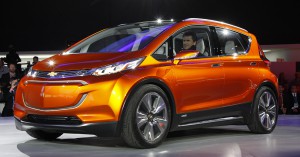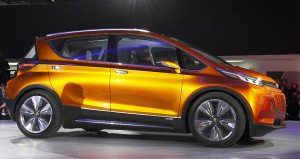
The Chevy Bolt would deliver significantly longer range than almost any current battery-electric vehicle - for around $30,000. Photo by Len Katz.
General Motors will begin building a production version of its Chevrolet Bolt battery-electric concept vehicle in October 2016, several well-placed company sources told TheDetroitBureau.com, a move that will put GM into direct competition with California EV start-up Tesla Motors, as well as more traditional automakers such as Nissan and BMW.
Unveiled at the North American International Auto Show in Detroit last month, the Chevy Bolt concept was expected to deliver about 200 miles of range per charge – more than double that of most of the electric vehicles currently on the market. That would address the issue of “range anxiety’ which, industry analysts say, has held back demand for battery-electric vehicles, or BEVs.
GM officials, meanwhile, said they would deliver the Bolt for around $30,000, which would put it much closer to the price tag of a comparable, gas-powered vehicle.
The Bolt is to be assembled at the Orion Township plant, north of Detroit, that currently produces several GM small cars, including a more limited-range battery-electric version of the maker’s Spark minicar. A source said a report by the Reuter’s news service that production would run between 25,000 and 30,000 Bolts annually was “not inaccurate.”
That figure is expected to include a variant of the Chevy Bolt that will wear an Opel badge for sale in Europe – a market Chevrolet pulled out of two years ago.
(Affordability, range key for Chevy Bolt. Click Here for full coverage of the battery-car’s Detroit debut.)

The Bolt would take on the planned Tesla Model III - and may beat it to market. Photo credit: Len Katz.
Though he declined to comment on production plans for Bolt, Chevy spokesman Mike Albanoo said, “We know we can do this type of vehicle. We’re confident we can deliver a car for around $30,000 with around 200 miles range.”
Currently, most BEVs are limited to 100 miles or less per charge – which is the equivalent of barely a quarter tank of gas in most vehicles. Industry analysts like David Sullivan, of AutoPacific, Inc., say that is one reason why demand for battery-electric models accounted for barely 0.5% of the total U.S. market in 2014.
Sullivan also said he was impressed that the automaker was willing to take the risk of launching a production version of the Bolt, one of the most widely covered unveilings at this year’s Detroit Auto Show. “The old General Motors (prior to its 2009 bankruptcy) never would have been able to approve a project like this because the business case is so difficult to make. This shows how much they’ve changed.”
It’s unclear how much corporate pride and image played into the business case, but several GM insiders told TheDetroitBureau.com they were proud to see the maker take a lead in bringing out a longer-range but affordable battery car – which now seems likely to reach market ahead of a similar product planned by plucky rival Tesla. The California carmaker has been struggling with a series of delays in its product programs. Its Model X battery SUV, originally expected to debut in early 2013, now appears unlikely to reach market before 2016. That would further push back Tesla’s own, $30,000 Model III.
Beating Tesla “is the plan,” said a well-placed source in GM’s electric vehicle program. “We want to put a little muzzle on Elon,” Tesla founder Elon Musk.
(Tesla won’t deliver profit til 2020, cautions Musk, due to product development efforts. Click Here for the story.)
The concept version of the Chevy Bolt is a compact 5-door hatchback that looks like a cross between the current Chevy Spark EV and the new BMW i3 electric vehicle. The latter, recently named Green Car of the Year, manages less than 100 miles per charge. To travel greater distances, customers can order an optional range-extending gas engine that turns it into a plug-in hybrid similar to the current Chevrolet Volt.
The Bolt-with-a-B will use next-generation lithium-ion batteries produced by GM’s South Korean ally, LG Chem. The pack is expected to be assembled at a GM facility south of Detroit already producing packs for the Volt-with-a-V and the Spark EV.
One question sources couldn’t answer is what name Chevy will use when the new battery-car it comes to market next year. The potential confusion between Bolt and Volt was a frequent topic after the Detroit Auto Show unveiling, and Alan Batey, GM’s president of North American operations has told TheDetroitBureau.com the maker is considering alternative badges.
For more important, said analyst Sullivan, will be making sure the new battery-car, whatever it’s called, is up to snuff.
Since it will go up against the likes of Tesla and BMW, he stressed, “this cannot be a half-baked attempt. It will have to have some real competitive attributes, not just from a powertrain standpoint but in terms of features, fit and finish.”
Tesla and Chevy aren’t the only ones planning to launch extended-range electric vehicles. CEO Carlos Ghosn recently told TheDetroitBureau.com Nissan is working on a 200-mile version of the Leaf, currently the world’s best-selling battery-car.
(Kia to unveil Trail’ster, an eAWD concept vehicle, at the Chicago Auto Show. Click Here for a preview.)

No unfortunately an average of 200 miles range will not eliminate customer anxiety at all. Jump in a Bolt and drive around the snow belt areas of the country with the heater/defrosters, radio, wipers, etc. running normal and tell us what the real range is in single digit temps.
Only the gullible would buy into the current EV hype for anything but city driving.
Is it possible to design a car that doesn’t look like every other boring cookie cutter pile of plastic that even resembles a hint of style? It seems that the only styling difference is tweaking the shape of windows. And how about those plastic headlights that take up every contour of a front fender, no to mention they fade to yellow in 6 years. But Chevy still hangs onto this “Happy Grin” front end that they copied from the Movie “Cars”. I have no use for the inconvenience of an electric car. The Chevy Volt, the Chevy Bolt, what next? Chevy Jolt? how about a clean burning Diesel and call it the Chevy Revolt?